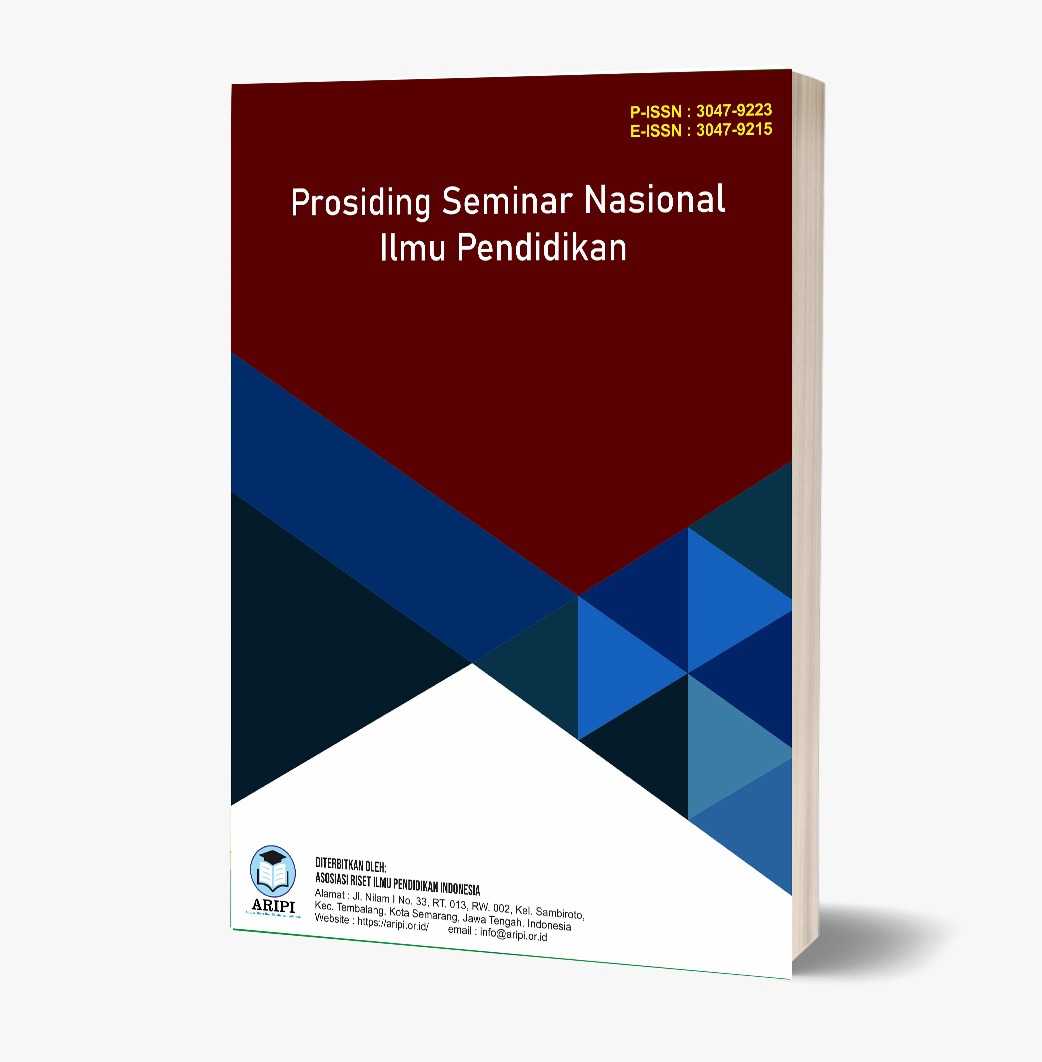Peran Kemampuan Teknologi dalam Meningkatkan Kinerja Pendidik Sekolah Dasar di Kabupaten Takalar
DOI:
https://doi.org/10.62951/prosemnasipi.v1i2.47Keywords:
Technological Capabilities, Educators, and Human ResourcesAbstract
This research aims to explain the role of the use of technology in the world of education, especially for the performance of an elementary school educator. The expertise and skills of a teaching staff or teacher in operating technological systems at this time are very important in facing challenges in the era of the industrial revolution 4.0. However, in reality there are still many teaching staff who still lack knowledge in operating technology. In fact, with the use of technology, someone can provide a more concrete picture when presenting material in the learning process. Therefore, it is necessary to implement applications for increasing skills (up-skilling) or updating skills (reskilling) of human resources in order to form competent and competent people. able to innovate optimally in their field. The method used in this research is the literature method which is based on relevant references and then interpreted using the analytical description method, which starts with collecting data systematically and consistently, which is then analyzed, selected and combined to then draw conclusions. using deductive analysis of general problems and then drawing specific conclusions. Then combined with the direct observation method, the results of observations in several elementary schools in Takalar Regency.
References
Andriani, S., Kesumawati, N., & Kristiawan, M. (2018). The impact of the transformational leadership and work motivation on instructors overall performance. World Wide Journal of Clinical and Technology Research, 7(7), 19–29.
Anni, C. T., & Rifa’i, A. (2013). Psikologi Pendidikan. Semarang: UNNES Press.
Asmani, J. M. (2019). Rekomendasi Efektif Pemanfaatan Teknologi Informasi dan Komunikasi dalam Dunia Pendidikan. Jogjakarta: Diva Press.
Fitriah, D., & Mirianda, M. U. (2019). Kesiapan Guru Dalam Menghadapi Tantangan Pendidikan Berbasis Teknologi. Prosiding Seminar Nasional Pendidikan Program Pascasarjana Universitas PGRI, 148–153.
Hardani, H., Ustiawaty, J., Utami, E. F., Istiqomah, R. R., Fardani, R. A., Sukmana, D. J., & Auliya, N. H. (2020). Metode Penelitian Kualitatif & Kuantitatif. Pustaka Ilmu.
Kemenristekdikti. (2019). Menristekdikti Umumkan Klasterisasi Perguruan Tinggi Indonesia 2019, Fokuskan Hasil dari Perguruan Tinggi. Retrieved from https://ristekdikti.go.id/kabar/menristekdikti-umumkan-klasterisasi-perguruan-tinggi-indonesia-2019-fokuskan-hasil-dari-perguruan-tinggi/
Kunandar. (2017). Guru Profesional: Implementasi Kurikulum Tingkat Satuan Pendidikan (KTSP) dan Sukses dalam Sertifikasi Guru. Jakarta: Rajagrafindo Persada.
Krismiyati. (2017). Pengembangan Sumber Daya Manusia dalam Meningkatkan Kualitas Pendidikan di SD Negeri Inpres Angkasa Biak. Jurnal Office, 3(1), 43–50. https://doi.org/10.26858/jo.v3i1.3459
Miles, M. B., & Huberman, A. M. (1994). An Expanded Sourcebook: Qualitative Data Analysis. London: Sage Publications.
Muhaimin, M. A. (2020). Manajemen Pendidikan (Aplikasinya dalam Penyusunan Rencana Pengembangan Sekolah/Madrasah). Jakarta: Prenada Media.
Rahmatullah, A. S., Mulyasa, E., Syahrani, S., Pongpalilu, F., & Putri, R. E. (2022). Digital era 4.0: The contribution to education and student psychology. Linguistics and Culture Review, 6, 89-107.
Robbins, S. (2017). Perilaku Organisasi. Jakarta: Indeks Kelompok Gramedia.
Rohida, L. (2018). Pengaruh Revolusi Industri 4.0 terhadap Kompetensi Sumber Daya Manusia. Jurnal Manajemen Dan Bisnis Indonesia, 6(1), 114–136. https://doi.org/10.31843/jmbi.v6i1.187
Shaleha, R., & Auladina, S. (2021). Analisis Kesiapan Siswa Filial Dambung Raya Dalam Mengikuti Analisis Nasional Berbasis Komputer di SMAN 1 Bintang Ara Kabupaten Tabalong. Journal of Educational and Language Research, 1(3), 221-234.
Rivai, V. (2019). Manajemen Sumber Daya Manusia Untuk Perusahaan Dari Teori ke Praktik. Jakarta: Raja Grafindo Persada.
Smith, J. A. P., & Larkin, M. (2019). Interpretative Phenomenological Analysis. London: Sage.
Sudarmanto. (2019). Kinerja dan Pengembangan Kompetensi SDM. Yogyakarta: Pustaka Pelajar.
Syarwani, M., & Syahrani, S. (2022). The function of statistics device management For instructional institutions in the course of Pandemic. Indonesian Journal of Education (INJOE), 3(2), 270–281. https://doi.org/10.54443/injoe.v3i2.3
Talim, B. (2013). Solusi Proaktif Permasalahan SDM di Indonesia. Pikiran Rakyat. Retrieved from http://www.pikiranrakyat.com
Uno, H. (2021). Teori Motivasi Dan Pengukurannya (Analisis di Bidang Pendidikan). Jakarta: Bumi Aksara.
Utomo, S. S. (2019). Guru di Era Revolusi Industri 4.0. Desain Pendidikan Untuk Meningkatkan Daya Saing Bangsa, 1(1), 70-83. Retrieved from https://eprints.uny.ac.id/65069/1/GURU%20DI%20ERA%20REVOLUSI%20INDUSTRI%204.0.pdf
Wojowasito, S., & Poerwadarminta, W. (1980). Kamus Umum Bahasa Indonesia. Bandung: Penerbit Balai Pustaka.
Downloads
Published
How to Cite
Issue
Section
License
Copyright (c) 2024 Prosiding Seminar Nasional Ilmu Pendidikan

This work is licensed under a Creative Commons Attribution-ShareAlike 4.0 International License.







